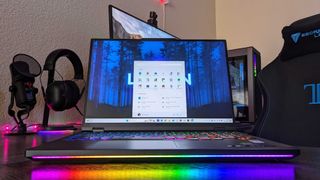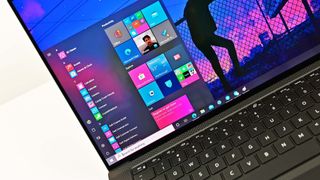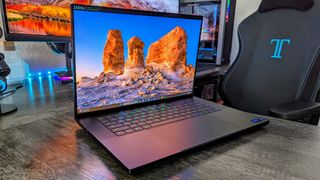Steam gamers adopt Windows 11 much quicker than everyone else, but why?
Gamers upgrade to Windows 11 at a dramatically different rate than non-gamers.

What you need to know
- Windows 11 saw a dip in market share in April 2024 while Windows 10 saw a rise in usage.
- In contrast, Steam gamers are almost evenly split between Windows 11 and Windows 10, with the former increasing in usage each month.
- A variety of factors likely contribute to the fact that gamers adopt Windows 11 at a higher rate than non-gamers, including the fact that many gaming PCs are newer systems that ship with Windows 11.
- Enterprise PCs are often kept on older operating systems for stability and there are also many computers that cannot upgrade to Windows 11.
Despite Windows 10 marching toward its end of support, the operating system is growing in market share. According to the most recent figures from Statcounter, just over 70% of desktop users in the world run Windows 10. Not only is that a drastically higher market share than that of Windows 11, which sits at 25.69%, it marks an increase month-over-month for Windows 10. The increase in Windows 10's market share is somewhat surprising, given that Windows 11 has been out for years, but it's particularly interesting because the trend does not extend to gamers.
Earlier today we reported on the fact that 45.15% of Steam users run Windows 11. That figure is still lower than the 51.02% of Steam gamers that use Windows 10, but the gap is much smaller than what's seen in the overall desktop market. Additionally, Windows 11 usage is going up when it comes to Steam users. The Windows 11 share went up 3.54% in April 2024, according to the latest Steam monthly hardware survey. Windows 10's share went down 3.38% in the same timeframe, so it's not like gamers are scurrying off to macOS or Linux.
Why aren't people upgrading to Windows 11?

Since there are over a billion PCs running Windows, there are several factors when it comes to upgrading to a new version of the operating system. Windows 11 has strict minimum requirements that prevent many PCs from upgrading. There are also users who prefer to keep using what works and that will only transition to Windows 11 when they have to. While the disparity wasn't as dramatic, many Windows 7 users kept using that operating system until it reached end of support.
There are also plenty of PCs that aren't controlled by the primary user of the device. Enterprise customers tend to value stability over getting the latest features onto work PCs. Organizations that manage employee devices may stay on Windows 10 as long possible, including past the October 2025 cutoff date for Windows 10 support.
I doubt Microsoft would offer extended support and security updates for Windows 10 if there wasn't demand. Keeping Windows 10 secure will cost $61 per device for the first year and that cost will double annually for three years.
Everyday users who rely on Windows for a few apps and a web browser may not find a compelling reason to upgrade to Windows 11 either. Many of our readers are enthusiasts and study the ins and outs of all Windows updates, but millions of people only use their PC for a few specific tasks. I suspect a lot of those from the latter group take the approach of "if it ain't broke, don't fix it."
Why do gamers upgrade to Windows 11?

Gamers are a different type of Windows user than the non-gaming audience. Those who game on their PC often want to get the most out of their systems and get the best performance of their games. If a specific feature is exclusive to Windows 11, gamers are likely to upgrade, assuming their system supports it.
Get the Windows Central Newsletter
All the latest news, reviews, and guides for Windows and Xbox diehards.
While many PC gamers build their own systems, prebuilt PCs and gaming laptops are popular as well. The best gaming laptops and best prebuilt PCs are generally going to be newer systems with the latest CPUs, GPUs, and other components. As the launch of Windows 11 moves further in the rearview mirror, more gaming PCs ship with Windows 11 rather than Windows 10.
I also suspect that people who play games through Steam are more technical users than those who only use their PC for general productivity. Steam players are going to understand the pros and cons of upgrading to Windows 11. Based on the latest Steam survey, it's clear that gamers are moving to Windows 11 at a higher rate than general users.

Sean Endicott is a tech journalist at Windows Central, specializing in Windows, Microsoft software, AI, and PCs. He's covered major launches, from Windows 10 and 11 to the rise of AI tools like ChatGPT. Sean's journey began with the Lumia 740, leading to strong ties with app developers. Outside writing, he coaches American football, utilizing Microsoft services to manage his team. He studied broadcast journalism at Nottingham Trent University and is active on X @SeanEndicott_ and Threads @sean_endicott_.
-
bazanime Many non-technical users out there have older computers that are incompatible with Win 11 but work perfectly fine for their low-impact usage on Win 10. They will likely use it till it stops running or can afford to buy a new computer.Reply
The requirements are more strict this time down to the hardware level and thus have limited immediate adoption greater than previous versions. -
The Werewolf It's also a case where Win 11 breaks so many workflows at such basic levels. The new start menu means throwing out all the muscle memory you have for the Win 10 start menu - and finding things that aren't what Microsoft thinks you want is amazingly painful. The new right click on the desktop means 2 or more clicks for many tasks that used to take one and finding those tasks in the new submenus. You can't pin the taskbar to the left or right, so if your hand knows to go to the top left for the start menu, that's going to be a constant annoyance.Reply
Then there's all the dubious 'new' features like tabbed file explorer windows. Does EVERYTHING have to behave like a browser - and badly at that? Why is the power button in the start menu - but the settings button in the popup on the RIGHT side? Oh while we're at it - WHO though a centered taskbar was a good idea? Did Microsoft completely forget about Fitts' Law?
AND THEN there's the ads... the hardware restrictions... the loss of so many functions people relied on with no real replacement because since they were baked into Win 10, there was no reason to replace them...
In almost every way, Win 11 feels like a panic redesign in exactly the same way Win 8 was Microsoft panicking over the belief that everyone was going to switch to the iPad, and in exactly the same way, I'll wait for Win 12 in the hopes that like after Win 8, Microsoft regroups, stops acting like it's lost its collective minds and after Win 11 they step back and rethink this mess that literally NO ONE asked for.